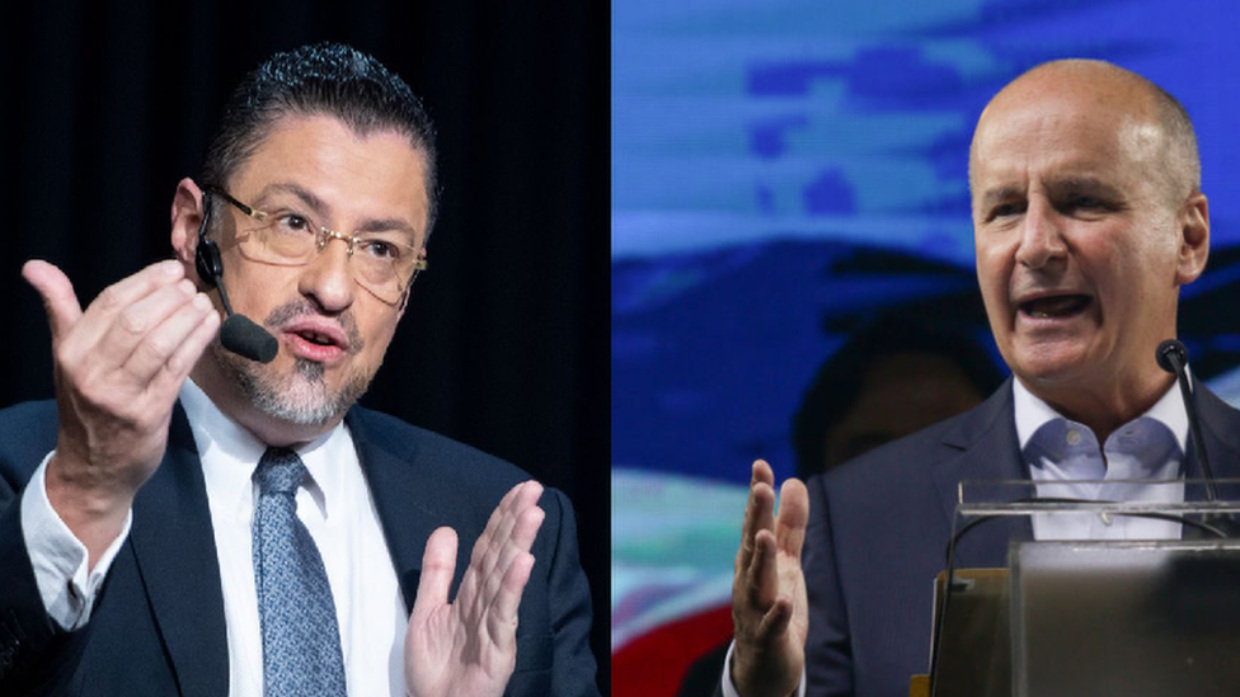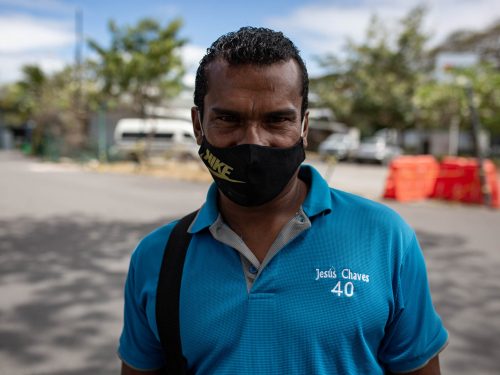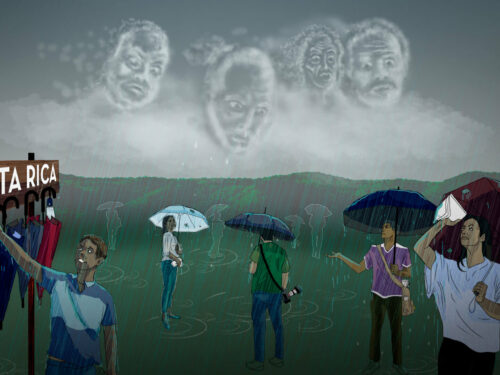
The Latin American Center for Journalistic Investigation (CLIP for the Spanish acronym), The Voice of Guanacaste and seven other journalistic media outlets in Costa Rica invited the presidential candidates to participate in a transparency exercise heading into the second round of elections on April 3.
The alliance asked Jose Maria Figueres Olsen and Rodrigo Alberto Chaves Robles to fill out a questionnaire with questions about their assets, election campaign financing, political negotiations and agreements, and legal proceedings that they are or were involved in.
Neither one responded within the requested 15-day period.
CLIP and the allied media believe that transparency is necessary for democracy to function the best. We’re convinced that getting to know the candidates better is of the greatest public interest and that it also helps citizens to make informed choices.
The transparency of those who aspire to govern Costa Rica has the power to strengthen the country’s internationally recognized democratic tradition, especially when the region is now besieged by authoritarianism.
We’re aware that legislation doesn’t require candidates to make public information about their assets and business relationships, as other democracies do. However, we asked them to make this information transparent, setting an example for the continent and the world.
After all, when someone is elected, they’ll have to provide this detailed information in a confidential declaration of assets before the Comptroller General of the Republic.
Considering that none of the candidates in the race received the necessary support to win in the first round, it’s also imperative to know the political negotiations that they and their parties have forged with other political forces that were eliminated from the process and with different sectors of society.
The allied media members are Noticias Repretel, Trece Costa Rica Noticias, CRHoy.com, Delfino.CR, Semanario Universidad, UCR Interferencia Radio Station, Doble Check and The Voice of Guanacaste.
Below is the questionnaire we sent to the candidates.
ABOUT YOUR ASSETS:
- Describe the positions you’ve held in the last 10 years. Entity or organization, country, position held, start date and end date.
- Real Estate. Assets you own directly or indirectly in any country or territory. Provide registration information, address of the property, real right that you exercise, main activity for which the property is used, date the deed was registered.
- Personal property subject to registration in Costa Rica or in any other country or territory. Description of the property, brand, model and year, identification number, estimated current value.
- Assets that can’t be registered: Type of asset, description of the asset, brand name, serial number, estimated current value.
- Intangible assets: Country, type of asset, the way you obtained the asset, quantity and estimated value, registration number.
- Salaries, consultancies and other income: Country, type of income, institution, company, organization or person from which it is earned, type of payment, monthly amount earned, period covered. (Ex: Salary, pension, rent, among others).
- Checking and savings accounts: Indicate the number of cards by country or territory and the issuing entities.
- Investments: Country, issuing entity, type of investment, number, value, term in months, date of acquisition, number of coupons (at the date of acquisition), amount of coupons (global amount at the date of acquisition).
- Participation in companies, businesses or legal entities: Country where it was formed, date it was formed, subsidiaries, company name, legal entity ID, name of all shareholders, UBO (Ultimate Beneficial Owner), management position held, company address, shares in the company (type of share, amount, nominal value); dividends received in the last five years corresponding to the indicated shares; contributions in cash or in kind (type of contribution, estimated value, contribution in kind); dividends received from the company for your corporate participation in other national or foreign organizations (name of the organization, value).
- Bonds: Country, issuing entity, number, series, face value, interest rate, acquisition date, maturity date, number of coupons at the date of acquisition, amount of the coupons (global amount at the date of acquisition).
- Funds or trusts: Country, type of fund or trust, banking institution or authorized entity, date of affiliation or constitution, balance to date.
- Other equity interests: Type, estimated value.
- Liabilities: Country of the creditor, individual creditor or entity, transaction number, balance to date, purpose of the loan.
- Bonds: Individual creditor or entity, name and identification of the debtor, operation number, original amount, balance to date, purpose of the loan.
- Changes in assets: Refers to all changes in assets that occurred within the past five years from the present date. Type of asset, name of the acquirer, title by which it was transferred, amount of the operation, date of the operation.
- Time scope of obligations acquired and/or expired: Type of obligation, individual creditor or entity, number of the obligation, date of constitution, original amount, purpose of the loan.
ON YOUR ELECTION CAMPAIGN FINANCING:
Name, ID and amount of taxpayers in pre-campaign and election campaign during 2021 and 2022
Name, ID and type of service given by the taxpayers as donations in kind in the pre-campaign and the campaign during the years 2021 and 2022.
ON POLITICAL NEGOTIATIONS AND AGREEMENTS:
Which of the following people have you met or had contact with, directly or indirectly, after the first round of elections on February 6?
- Rolando Araya Monge
- Oscar Lopez Arias
- Jose Maria Villalta Florez-Estrada
- Welmer Ramos Gonzalez
- Christian Rivera Paniagua
- Maricela Morales Mora
- Roulan Jimenez Chavarria
- Carmen Quesada Santamaria
- Eliecer Feinzaig Mintz
- Federico Malavassi Calvo
- Luis Alberto Cordero Arias
- Oscar Campos Chavarria
- Greivin Moya Carpio
- Walter Muñoz Cespedes
- Jose Maria Figueres
- Eduardo Cruickshank Smith
- Sergio Mena Diaz
- Fabricio Alvarado Muñoz
- Rodolfo Piza Rocafort
- Rodolfo Hernandez Gomez
- Lineth Saborio Chaverri
- Rodrigo Chavez Robles
- Martin Chinchilla Castro
- Natalia Diaz Quintana
- Jhon Vega Masis
Indicate which themes have been recurring throughout these conversations and political agreements:
- Appointments
- Public policies
- Law proposals
- Constitutional reforms
- Referendums
- Tax exemptions
- Tax reductions
- Public works concessions
- Religious freedom
- Freedom of the press
- Right of conscientious objection
- Attracting foreign investment
- Renewable energy
- Climate change
- Tax reform
- Labor reform
- Public sector reforms
- Downsizing the State
- Closure of institutions
- Streamlining procedures
- Customs reform or operations
- Public debt
Which of the following sectors have you met or had contact with, directly or indirectly, after the first round of elections on February 6?
- Tourism
- Industry
- Commerce
- Free trade zones
- Exporters
- Banking
- Agricultural
- Unions
- Religious leaders
- Environmentalists
- Energy
- Telecommunications
- Cooperative movement
- Directors and/or shareholders of the media
Which of the following topics have you discussed during the conversations held with those sectors?
- Appointments
- Public policies
- Law proposals
- Constitutional reforms
- Referendums
- Tax exemptions
- Tax reductions
- Public works concessions
- Religious freedom
- Freedom of the press
- Right of conscientious objection
- Attracting foreign investment
- Renewable energy
- Climate change
- Tax reform
- Labor reform
- Public sector reforms
- State reduction
- Closure of institutions
- Streamlining procedures
- Customs reform or operations
- Public debt
On which of the following issues or initiatives would you be willing to change your original positions as a result of a negotiation or alliance?
- Right of conscientious objection
- Tax reduction
- Oil exploitation
- Mining concessions
- Tax exemptions
- Dignified death
- Reforms to the Electoral Code
- Closure of Recope
- Therapeutic abortion
- Same-sex marriage
- Interoceanic Dry Canal
- Privatization of the electricity sector
- Secular state
- Electric train
- Strengthening the cooperative model
- Increasing the tax burden on free trade zones
- Making mandatory vaccination against COVID more flexible
- Downsizing the public sector
- Tax increases
- Making public employees’ declarations of assets public
- Closures of public institutions
ABOUT JUDICIAL OR DISCIPLINARY PROCESSES THAT YOU ARE OR HAVE BEEN INVOLVED IN:
Please provide details about judicial or disciplinary files that you have been a party to, inside or outside of Costa Rica, with the following data for each process:
- File number:
- Process type:
- Office:
- Date it began:
- Names of the parties (with the detail of which party you are):
- Current status of the process (if it has already been closed or if it’s still in progress):
- Result (if there is one already):
- Date it ended (if applicable):







Comments